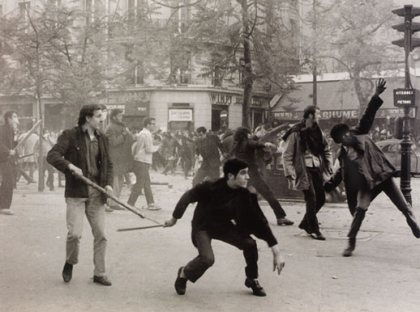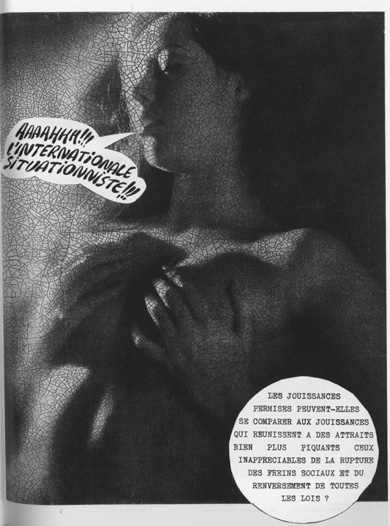
Five Hours of Sleep
by David Noriega
When I was fourteen I would stay up late every night numbing my brain at the family computer. Not unusual, of course, but it caused my mother great distress -- not because of the brain-numbing, or out of any fear of cyber-debasement or indoctrination, which would have been reasonable, but simply because she was afraid I wasn't getting enough sleep. One morning, as I poured tabasco on a bagel coated with melted cheese, she looked at my puffy eyes and said, in that crippling tone native to mothers: "Now David. How much sleep did you get last night?"
"Um... Like five hours?"
"Davey dear, that is simply not enough. You need at least eight hours of sleep every night," she answered, stat, citing that oddly ubiquitous figure that seems to enjoy the backing of the entire scientific community. (Why eight? I often wondered. Why not seven, or nine?)
The next morning, after another night of rigorous and purposeful e-research, I had an air-tight retort ready to fling like a paving stone through the drifting clouds of tear gas:
" 'COMRADES,' " I said, " '5 hours of sleep a night are indispensable. We need you for the revolution!' "
"Where the hell did you get that?" She was bewildered.
I told her. It came from a website listing, in blue comic sans font, scores of graffiti left on the streets of Paris after the riots of May 1968. (The site, charmingly antiquated, still exists.)

My romps down the information superhighway weren't usually this content-heavy. You can imagine. But two or three times a week I wound up image-searching shots from the famous and famously photogenic riots, or, if my handful of open IM windows stopped flashing long enough to allow it, actually reading about them. My main point of interest was The Situationist International, the band of Marxist, avant-garde artists, writers and political agitators who were the principal theorists of the uprising, and whose slogans comprised most of the graffiti I read like mantras.
I had just moved to an Upstate New York strip-mall suburb from a huge city in a different country; my street was named after a kind of tree; I lived three blocks (if you can call the spaces between suburban streets blocks) away from a Jo-Ann Fabrics; I hated mowing the lawn. Now I call this by name: alienation. Not really in the Marxist sense, given that I wasn't actually producing anything, but mostly in the teenage angst kind of way, standard and risible: I was generally happy and definitely comfortable, and yet things felt inauthentic. People seemed fake. School was run like a furniture factory. If I walked anywhere all I'd see was Blockbuster, Starbucks, houses, trees, Applebees.

Within a year or so I started discovering some of the requisite American-kid palliatives – punk shows in American Legion basements in neighboring towns and the like -- but before these things were known or available to me I spent a good amount of time thinking myself a little Situationist-in-Training. Never mind that I hardly understood the bulk of what they were actually saying: I bought a copy of Guy Debord's The Society of the Spectacle (arguably the founding text of the Situationist International), read five pages, underlined everything, and went right back to the computer.
There I found things adequately paraphrased and condensed. What I understood, vaguely: capitalism has made a deadening spectacle of everyday life, within which authentic, visceral experience is no longer possible; and yet we must try, deliberately and creatively, to generate such experience for ourselves - to construct, control, and live within our own 'situations.' Here lay the road to individual emancipation and, eventually, collective revolution. It made sense and the slogans were great: "You will end up dying of comfort," "Live without dead time," and my favorite: "Humanity won't be happy till the last capitalist is hung from the guts of the last bureaucrat."
The Situationists theorized the Spectacle under the belief that it could be resisted and eventually dismantled -- through art, mostly, and also critical thinking and political organizing, but more importantly through a practical and personal cultivation of a "radical subjectivity" in everyday life. This could be as simple as the psychogeographic dérive -- a drift, an aimless walk, a means of re-perceiving and re-imagining urban space and weakening the dead grip of routinized daily experience.

I never did much to apply these little revolutionary lessons. I wasn't a very good Situationist. I signed up for the Adbusters email newsletter, and I took aimless walks (which I was doing anyway), but that was about it. I did well in school, where I was obedient. Sometimes I watched movies at the local Loews, which was next to the Applebees. I slept five hours a night, but only on weeknights, and not because I was busy plotting the revolution.
It wasn't until college that I found a number of other guys -- always guys -- who'd been equally enamored of Paris '68 and the Situationists as adolescents. Our infatuations were comparably superficial: we weren't practicing daily acts of resistance and we certainly couldn't tell you much about Marxist critical theory, but we did think those guys in the pictures building barricades in the streets of Paris looked fucking cool.
How depressing: we went ahead and proved Debord right. The Spectacle appropriates all; we young would-be Situationists were entranced by images and slogans; the revolution was a bunch of dandies chucking rocks. (It's true: May '68 is in the books as a monument to disappointment, a major historical ice-on-the-boner, and all that's left is some cool posters.)

In my case, at least, those nights reading Situationist graffiti eventually led down some worthwhile roads, aesthetically speaking, even though those roads are populated almost exclusively by dead French dudes (Baudelaire, Tzara, Jarry). Moreover, there are a few of us, tattooed psychogeographists mostly, who've managed to take those youthful leanings and turn them into something good. And finally, no matter how thoroughly hijacked our lives may be by the soulless Spectacle, there's always this:
[youtube=http://www.youtube.com/watch?v=5pFv8CAniYQ]
David Noriega is the senior contributor to This Recording. He last wrote about The Melvins in these pages. More about him here.

"The Amazing Sounds of Orgy" - Radiohead (mp3)
"Fog" - Radiohead (mp3)
"Transatlantic Drawl" - Radiohead (mp3)
PREVIOUSLY ON THIS RECORDING
Bridget Moloney: Tell Her You Love Her
Molly Lambert: Feminism Is So Hott
Becca Weiner: Three-Ways & The FK
